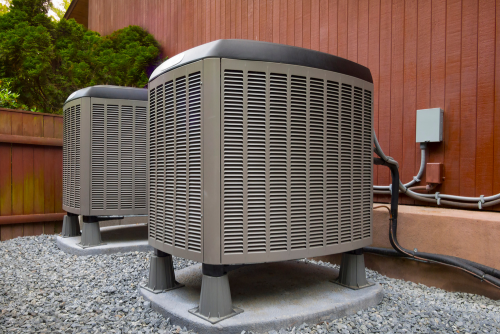Heat Pumps

Heat Pumps
A heat pump is part of a heating and cooling system and is installed outside your home.
So, what is a heat pump? A heat pump is part of a home heating and cooling system and is installed outside your home. Like an air conditioner such as central air, it can cool your home, but it’s also capable of providing heat. In cooler months, a heat pump pulls heat from the cold outdoor air and transfers it indoors, and in warmer months, it pulls heat out of indoor air to cool your home. They are powered by electricity and transfer heat using a refrigerant to provide comfort all year round. Because they handle both cooling and heating, homeowners may not need to install separate systems to heat their homes. In colder climates, an electric heat strip can be added to the indoor fan coil for additional capabilities. Heat pumps do not burn fossil fuel like furnaces do, making them more environmentally friendly.
HOW DOES A HEAT PUMP WORK?
How does a heat pump work? Heat pumps transfer heat from one place to another by different air or heat sources. Air-source heat pumps move heat between the air inside a home and the air outside the home, while ground-source heat pumps (known as geothermal heat pumps) transfer heat between the air inside a home and the ground outside a home. We will focus on air-source heat pumps, but the basic operation is the same for both.
WHERE DO HEAT PUMPS WORK BEST?
Homeowners in need of a new heating or cooling system may consider the type of climate they live in before purchasing a heat pump system. Heat pumps are more common in milder climates, where the temperature does not typically drop below freezing. In colder regions, they can also be combined with furnaces for energy-efficient heating on all but the coldest days. When the temperature outside drops too low for the heat pump to operate effectively, the system will instead use the furnace to generate heat. This kind of system is often called a dual fuel system – it is very energy efficient and cost-effective.
Pros and Cons of Heat Pumps
Heat pumps can help consumers save on utilities, but they have limitations. First, they tend to be somewhat ineffective in cold climates where the outdoor air temperature falls near or below freezing on a regular basis, although innovators are working to improve upon this. This is because moving heat from a very cold area to a hotter one takes more energy than moving heat between two areas with a more moderate temperature difference.
There's also more heat available outside in a moderate climate than in a cold climate. It's important to note that even in a cold climate, there's still heat in the outside air to be pumped indoors, but the unit needs to work harder to extract the heat that's available. Supplemental energy may be required to make the heat pump produce enough warmth to comfortably heat your home when the temperature falls below freezing, and that's no good.
The heat produced by heat pumps isn't as intense as the heat produced by a gas or oil-burning furnace. People who are used to traditional furnaces can be uncomfortable with the milder heat produced by these systems. Other people prefer the warmth produced by heat pumps, because heat pumps distribute heat evenly throughout the house, meaning there are no cold spots. A heat pump will also turn on and off less often than a gas furnace, and most systems have eliminated the blowing of cold air through the vents that used to occur when the system temporarily switched into reverse to defrost the coils.
Before you install a heat pump, you'll need to consider what kind of supplemental or backup heating you may need to use when the heat pump can't work efficiently. Many heat pumps use supplemental electrical heating, but you might also use an oil burner or an adapted gas furnace. Whatever type of heating system is common in your area is likely the most efficient and cost-effective backup method. You can always call your local utility company for information.
Ground-source heat pumps are better dehumidifiers than normal air conditioners because these systems typically have larger, flat return coils that condition and dehumidify more air than the corresponding coil in an air conditioning system. Air-source heat pumps have about the same dehumidifying capabilities as air-conditioning systems. If you have any humidifying or dehumidifying needs, take this into consideration.
Now that you know the pros and the cons of heat pumps, read on to learn what to look for when you buy a heat pump.

